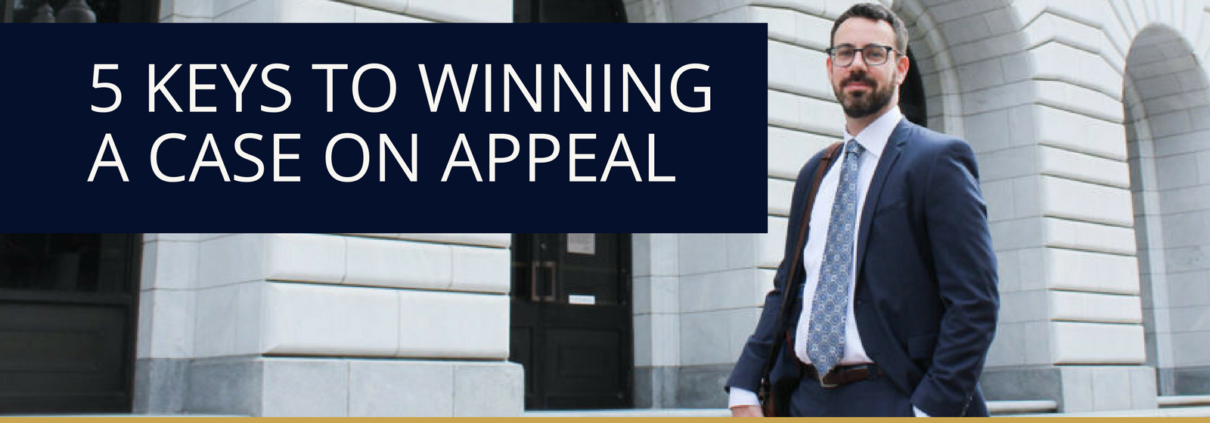Appealing an unfavorable verdict can be a daunting task, but an effective attorney can synthesize a complicated case into a few critical arguments to give you the best chance at succeeding. Although each appeal is different, here are 5 keys to a quality appeal that apply to nearly every case.
-
Clarity is key
An appeals panel, the group of 3 appellate judges that decides your appeal, is tasked with the very difficult job of assessing an extensive trial record when considering an appeal. It is important to keep in mind that the appellate judges have not been involved in the previous case prior to the appeal and are therefore seeing the facts and arguments for the very first time. As a result, an effective appeal should be brief, logical, and clear. No judge wants to dig through a convoluted trial record to identify key issues in a case. Do the leg work for them and present a clear, logical argument that points to specific support in the trial record. The less the judge has to work to understand your argument, the better.
-
Present your strongest arguments
It is critical that an appeal presents the strongest arguments rather than a wide range of arguments – quality over quantity, if you will. Employing too many arguments can create clutter and confusion, making it harder for a judge to follow the logic behind your appeal and diminishing the effectiveness of each argument. Worse yet, too many arguments may create contradictions that can be exploited by the opposing party or undermine the strength of your primary argument. Including alternative arguments is encouraged, but they should be brief and should never distract from your strongest argument.
-
Honesty is the best policy
This may seem like a no-brainer but many appeals ignore or downplay aspects of the factual record or holdings in other cases that are not favorable to their position. This is a mistake. You can be sure that the State or the Federal Government will point out all of the negative aspects of your case. Appellate judges are also experts at spotting these deficiencies and if they decide that the inclusion or omission of a particular piece of information is misleading, they may be encouraged to take an even closer look at the rest of your brief with an extra critical eye. The best approach is to directly confront facts and holdings that are harmful to your argument, and explain to your panel why you should still win your appeal despite these negative facts or cases.
-
The little things matter on appeal
While the details always matter when you’re dealing with the law, they matter even more on appeal. The procedural rules and filing requirements on appeal are technical and confusing if you’re not an experienced appeals attorney. Most importantly, following these strict rules can be the difference between winning and losing an appeal. I’ve seen other lawyers not get their briefs in on time or fail to receive oral argument on appeal by not following an appellate court’s rules and procedure. If you want to receive relief from the appeals court, you’ve got to know how to follow its rules so that your best arguments can be heard.
-
Respond directly to the trial court
A trial can be a fast-moving, hectic event in which the trial court has to make many quick, snap decisions that can directly impact how fairly your innocence or your guilt is decided. An appeal, on the other hand, is an opportunity to take a step back, slow down, and really dig into what went wrong at trial. Your appeal must respond directly to the trial court’s decisions and any reasons given in support of that decision. An effective appeal will show the appellate court exactly how the trial court got a decision wrong under the law and how that incorrect decision affected the fairness of your trial.
The Bottomline
In many of these instances, it will be up to your appeals attorney to draw clarity from the records and present your strongest arguments. When seeking an appeals attorney, it is important to find a lawyer who has a solid background in doing the preparation work, writing a strong argument, and is able to advocate strongly on your behalf in the courtroom.
If you received a conviction in Louisiana and are looking to overturn your conviction, contact the Law Office of Sam Winston for your free consultation today.



